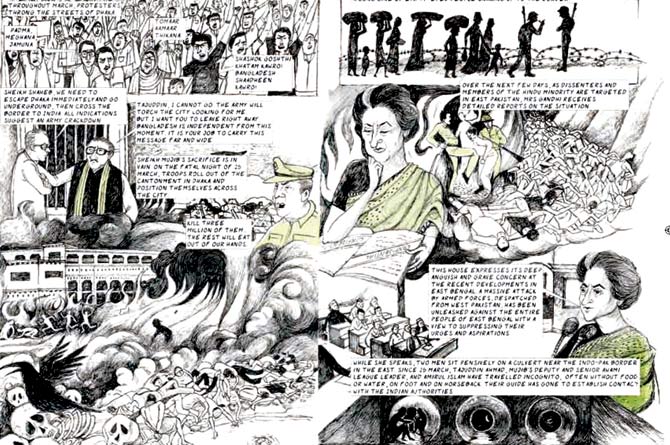There's more to India's only female prime minister than her being Rahul Gandhi's dadi or Priyanka's lookalike, says Indira, the book


ADVERTISEMENT
The best part about graphic novels is that you look at the story differently depending on what your age is. What Tintin and his adventures meant to us as 10-year-olds is definitely not how we look at the Belgian journalist and his alcoholic friend now. So when Context, the newly launched literary imprint of Westland Publications, thought of a book to celebrate Indira Gandhi's birth centenary year, we knew we would see the Indian icon in a new light, unlike in our textbooks from history class. Especially when the end product is a seamlessly interwoven prose and graphic narrative.

The book is a collaboration between Delhi-based writer Devapriya Roy, who is back after her The Heat and Dust Project, and Delhi-based animation filmmaker and illustrator Priya Kuriyan, and both of them had almost the same things to say about their subject. "She is a fascinating personality. I had never done biography before. My characters have never been people who existed. So a lot of research went into making the book what it is," Kuriyan says, adding, "It was quite challenging. There were also aspects about her that no research could lead us to."

Roy explains over the phone, "Ours was an arranged marriage. Priya and I were building the character together by responding to each other's perspectives. Initially, I would use prose, which Priya would then turn into a graphic narrative." In the book, which releases on February 20, when a history teacher asks class VI students to write an essay based on their names, Indira Thapa finds herself delving into the life of the country's only female prime minister. The book traces the process of her research. So while the prose is about Indira, the girl, and her life, the graphic panels bring to life Gandhi's rise and fall, including the Bangladesh War (1971) and the Emergency (1975-77). The best part in the book is the seamless manner in which it introduces the Indian icon to millennials in an age of microfiction and Japanese manga.

Devapriya Roy and Priya Kuriyan
"We did a lot of travelling while doing this project. We travelled for four months. We visited Anand Bhavan in Allahabad and Raj Bhavan, and Priya tried to represent the architectural structures just the way she saw them," Roy says. The book took the duo almost a year to finish. Despite dealing with such a powerful subject, was there the urge to use colour? "There was but at the same time, I knew what we were dealing with. I really enjoyed illustrating Gandhi because she had such fantastic features, especially that streak of white hair. But there was a lot of going back and forth because Devapriya had never written for comics before," Kuriyan admits. Roy thoroughly enjoyed the project and would love to go back to writing novels about these times. "A lot had happened in India in the 10- to 14-odd years of her tenure. There's so much to write about. But right now, I'm working on the sequel to The Heat and Dust Project, Man. Woman. Road." For Kuriyan, however, it's time for a break because "doing comics can be very exhausting."
 Subscribe today by clicking the link and stay updated with the latest news!" Click here!
Subscribe today by clicking the link and stay updated with the latest news!" Click here!






